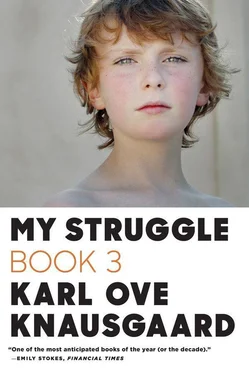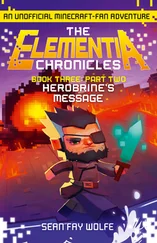Geir stopped at the crossroads.
“I’m going up to Vemund’s,” he said. “Coming?”
I shook my head. On the way down I thought I should go and visit a new friend, too. Dag Magne perhaps? But that would seem out of character, so I went home instead. Lay down on the bed reading until Yngve came in and asked if I wanted to play soccer with him in the road. I did. There was nothing I liked more than doing things with Yngve. Indoors we usually played games or listened to music together, while outdoors, we went our separate ways, him with his friends and me with mine, apart from during the holidays when we went swimming or played soccer or table tennis or badminton and in cases like now, when he was bored and had no one else to play with other than me.
For more than an hour we kicked a ball back and forth between us. For a while Yngve took shots at me in goal and I practiced goal kicks. Then we did some passing.
As if by a miracle my warts disappeared. They got smaller and smaller, and then, perhaps three weeks later, they had completely gone. My hands were so smooth it was hard to imagine they had ever been any different.
But Anne Lisbet didn’t come back. Whereas before she had squealed with pleasure whenever I had taken her cap or pulled her scarf or covered her eyes from behind, now she was irritated or even angry. I felt a stab of pain when I saw her and Solveig going to the bus accompanied by Eivind and Geir B, and every night before I went to sleep I imagined a situation in which I rescued them or somehow stood in a light that enabled her to see the error of her ways and return to me, unless, that is, I was imagining I was dead, and the immense sorrow that would overwhelm her, and the remorse when she realized that what she actually wanted — to be with me — was no longer possible, as I was lying in a coffin bedecked with wreaths and flowers. Death was generally a sweet thought at that time because it was not only Anne Lisbet who would regret what she had done but also Dad. Standing by my coffin, weeping for me, the prematurely departed. The whole estate would be there, and all the opinions they had held about me would have to be reevaluated because now I was gone and the person I had really been would appear in the utmost clarity for the first time. Yes, death was sweet and good and of great comfort. However, even if I was upset about Anne Lisbet, she was still there, I saw her every day at school, and as long as she was at school, there was hope, though precious little. The darkness that thinking about her could generate inside me was therefore of a different order from the other darkness that sometimes came over me, which had a depressing and burdening effect on everything, and which Geir also felt, it transpired. One evening we sat in his room and he asked me what was up with me.
“Nothing much,” I said.
“You’re so quiet!” he said.
“Oh, that,” I said. “I’m just fed up.”
“What about?”
“I don’t know. There’s no particular reason. I’m just fed up.”
“I feel like that sometimes, too,” he said.
“Do you?”
“Yes.”
“You’re just fed up for no particular reason?”
“Yes. I’m like that, too.”
“I didn’t realize,” I said. “Didn’t realize others could feel like that, too.”
“That’s what we’ll have to call it,” he said. “ Like that. We can say it when we’re in that mood. ‘I’m like that today,’ we can say, and then the other person will understand right away.”
“That’s a good idea,” I said.
There were other new words being added as well, for example, the one Yngve taught me, the real name for fucking was “intercourse,” and this knowledge was so shocking that I took Geir to the top of the mountain before I dared tell him. “It’s called intercourse ,” I told him, “but don’t say you heard it from me! You’ve got to promise me!” He promised. He was spending more and more time at Vemund’s house, and Vemund was coming down to see him now and then. I simply didn’t understand that and I told him so. Why do you spend time with Vemund? He’s fat and stupid and the worst in the class. He never really gave me a decent answer, just said he liked being there. Why? I said. What do you do that’s so fantastic? Well, Geir said, we sit and draw most of the time … Even in lessons it was Vemund he turned to when we had to work in pairs, instead of me, which he had done automatically before. I joined him a couple of times at Vemund’s, also to be close to Anne Lisbet, but I found what they did boring and when I said so and suggested something else they stuck together and wanted to continue what they were doing. That was fine by me, if he wanted to be with the class dunce, let him. Besides, we were still neighbors, it was still me he came to in the afternoons, and that spring we started going to soccer together. Almost all the kids in our road did. The training sessions were in Hove, and Mom and Geir’s mom took turns driving us there. Mom bought me a tracksuit when it started. It was my first, and I had great hopes before the day, imagining a sparkly-blue Adidas one, like Yngve’s, or even better, a Puma, or at least a Hummel or an Admiral. But the one she bought wasn’t a brand name. It was brown with white stripes, and even though I considered the color ugly, that wasn’t the worst thing about it. The worst was that the material wasn’t shiny but matte, a bit coarse, and it didn’t hang off your body, it clung to you, making my butt stick out even more than usual. When I put on the tracksuit that was all I could think about. Even when I ran onto the field and training began, it was all I could think about. My butt is sticking out like a balloon, I would think, running after the ball. My tracksuit is brown and ugly, I would think. I look like an idiot in it, I would think. An idiot, an idiot, an idiot.
However, I never said this to Mom. I pretended to be happy when I was given it because it had cost a lot of money, she had gone all over Arendal looking for it, and if I said I didn’t like it, she would first think I was ungrateful and then she would be sad that she had bought the wrong thing. And I didn’t want that. So I said, How nice. Great. Really. Just what I wanted.
The odd thing about the training sessions that spring was that there was such a big difference between the person I was inside and the person I was on the field. Inside myself I was full to the brim with thoughts and emotions about scoring and dribbling, about the terrible tracksuit I had, and my big butt and, by extension, my protruding teeth — whereas on the field, running around, I was, to all intents and purposes, completely invisible. There were so many kids on the field, an enormous melee of arms, legs, and heads following the ball like a swarm of mosquitoes, and the coaches didn’t know the names of more than a handful of them, the ones from their immediate neighborhood presumably, their sons, and their friends. The first time I stood out from the crowd was an evening when someone had kicked the ball into the forest behind the goal, where it was lost, and everyone was ordered over to look for it. Two, perhaps three, minutes of intensive searching followed. No one could find the ball. Then suddenly I saw it in front of me. Under a bush, it glowed, white and wonderful, in the dusk. I knew this was my opportunity, I knew I ought to shout, “Got it!” and carry it with me onto the field, so that the rightful credit fell to me, but I didn’t dare. Instead I just kicked it onto the field. “There’s the ball!” someone shouted. “Who found it?” someone else shouted. I emerged from the forest with all the others and said nothing, so it remained a mystery.
The second time was a similar situation, though even more flattering to me. I was running in a pack of players, maybe ten to twelve meters from the goal, the ball landed among us, everything was a vortex of limbs, and when the ball came free, a meter from me, I booted it as hard as I could and it rocketed in by the bottom of the post.
Читать дальше












